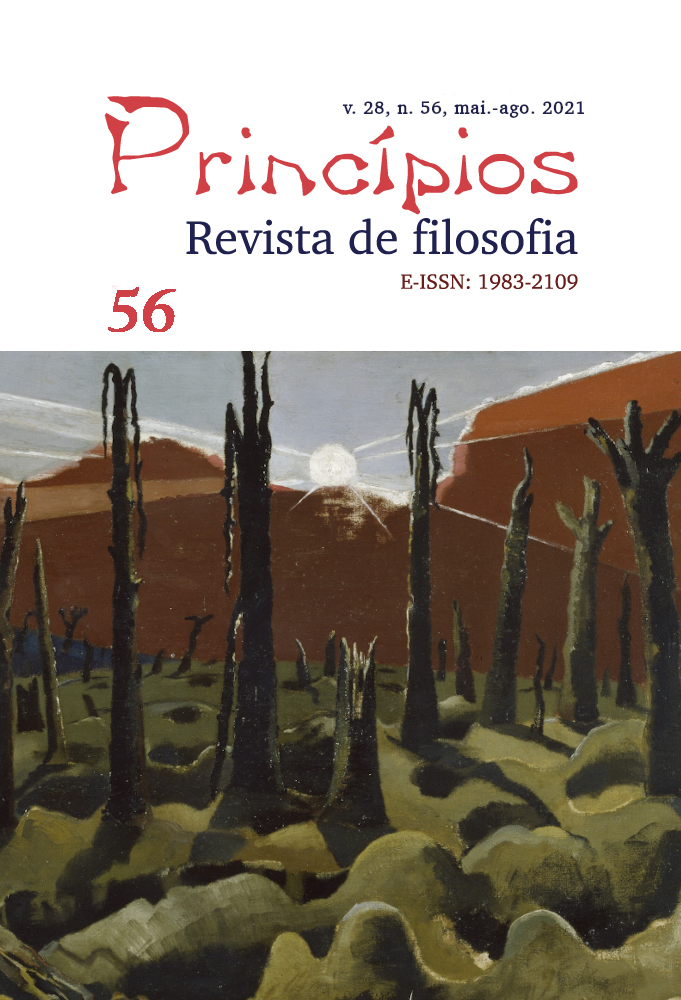What does it take for an author to create a fictional object?
DOI:
https://doi.org/10.21680/1983-2109.2021v28n56ID23120Palavras-chave:
Objetos Ficcionais, Objetos Abstratos, Artefatos, Atos de Fala, PerformativosResumo
Neste artigo eu respondo à objeção principal de Stuart Brock (2010, 2016) ao artefactualismo. De acordo com Brock, artefactualistas como Amie Thomasson (1999) não conseguem explicar como e quando os objetos ficcionais são criados, sendo o artefactualismo, portanto, um tipo de criacionismo teológico. Contrariamente a Brock, e adaptando a teoria dos atos de fala de John Austin (1962) ao presente caso, eu argumento que objetos ficcionais são criados através de um proferimento performativo que, para ser feliz, deve (i) ser realizado pelo indivíduo adequado (um autor ou autora), (ii) com as intenções apropriadas (o ato de realização de ficção), no contexto adequado (associado às nossas práticas pré-estabelecidas de ficção) onde o autor ou autora (iv) nomeia, fornece ao menos uma descrição ou oferece uma imagem para instituir o objeto individual através dos seus atos intencionais.
Downloads
Referências
ABELL, Catharine. Fiction: A Philosophical Analysis. Oxford: Oxford University Press, 2020
AUSTIN, John. How to Do Things with Words: The William James Lectures. Oxford: Clarendon Press, 1962.
BERTO, Francesco. Modal Meinongianism and Fiction: The Best of Three Worlds. In. Philosophical Studies, v. 152, n.3, pp. 313-335, 2011.
BRASIL. Código Civil, Lei 10.406, de 10 de janeiro de 2002. São Paulo: Revista dos Tribunais, 2002.
BROCK, Stuart. Fictionalism about Fictional Characters Revisited. In. Res Philosophica, v. 93, n. 2, pp. 377-403, 2016.
BROCK, Stuart. The Creationist Fiction: The Case Against Creationism about Fictional Characters. In. Philosophical Review, v. 119, n. 3, pp. 337-364, 2010.
CARROLL, Noel. The Wheel of Virtue: Art, Literature, and Moral Knowledge. In. The Journal of Aesthetics and Art Criticism, v. 60, n. 1, pp. 3-26, 2002.
CURRIE, Gregory. The Nature of Fiction. Cambridge: Cambridge University Press, 1990.
EVERETT, Anthony. The Nonexistent. Oxford: Oxford University Press, 2013.
GIBSON, John. Interpreting Words, Interpreting Worlds. In. The Journal of Aesthetics and Art Criticism, v. 64, n. 4, pp. 439-450, 2006.
INGARDEN, Roman. The Literary Work of Art: An Investigation on the Borderlines of Ontology, Logic, and Theory of Literature. Evanston: Northwestern University Press, 1973.
INWAGEN, Peter van. Fiction and Metaphysics. In. Philosophy and Literature, v. 7, n. 1, pp. 67-77, 1983.
INWAGEN, Peter van. Creatures of Fiction. In. American Philosophical Quarterly, v. 14, n. 4, pp. 299-208, 1977.
KAFKA, Franz. The Metamorphosis. Translated by Susan Bernofsky. New York: W. W. Norton & Company, 2014.
KIVY, Peter. Philosophies of Arts: An Essay in Differences. Cambridge: Cambridge University Press, 1997.
(Author omitted due to blind-review, 2020a)
(Author omitted due to blind-review, 2020b)
(Author omitted due to blind-review, 2020c)
SAINSBURY, Mark. Fiction and Fictionalism. London: Routledge, 2009.
SCHIFFER, Stephen. The Things we Mean. Oxford: Oxford University Press, 2003.
SCHIFFER, Stephen. Language-Created Language-Independent Entities. In. Philosophical Topics, v. 24, n. 1, pp. 149-167, 1996.
SEARLE, John. The Construction of Social Reality. New York: Penguin Books, 1995.
SEARLE, John. The Logical Status of Fictional Discourse. In. New Literary History, v. 6, n. 2, 1975.
STOCK, Kathleen. Only Imagine: Fiction, Interpretation and Imagination. Oxford: Oxford University Press, 2017.
THOMAS, Jenny. Meaning in Interaction: An Introduction to Pragmatics. New York: Routledge, 1995.
THOMASSON, Amie. Speaking of Fictional Characters. In. Dialectica, v. 57, n. 2, pp. 207-26, 2003.
THOMASSON, Amie. Fiction and Metaphysics. Cambridge: Cambridge University Press, 1999.
WITTGENSTEIN, Ludwig. Philosophical Investigations. Translated by G. E. M. Anscombe. Oxford: Basil Blackwell, 1953.
Downloads
Publicado
Como Citar
Edição
Seção
Licença
Autores mantêm os direitos autorais e concedem à revista o direito de primeira publicação, com o trabalho simultaneamente licenciado sob a Licença Creative Commons Attribution que permite o compartilhamento do trabalho com reconhecimento da autoria e publicação inicial nesta revista.
Termos da licença:
| Não Comercial (NC) | Os licenciados podem copiar, distribuir, exibir e executar a obra e fazer trabalhos derivados dela, desde que sejam para fins não comerciais. |
| Compartilha Igual (SA) | Os licenciados devem distribuir obras derivadas somente sob uma licença idêntica à que governa a obra original ou menos restritiva. |


 Português (Brasil)
Português (Brasil) English
English Español (España)
Español (España) Français (Canada)
Français (Canada)


